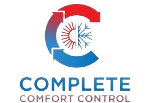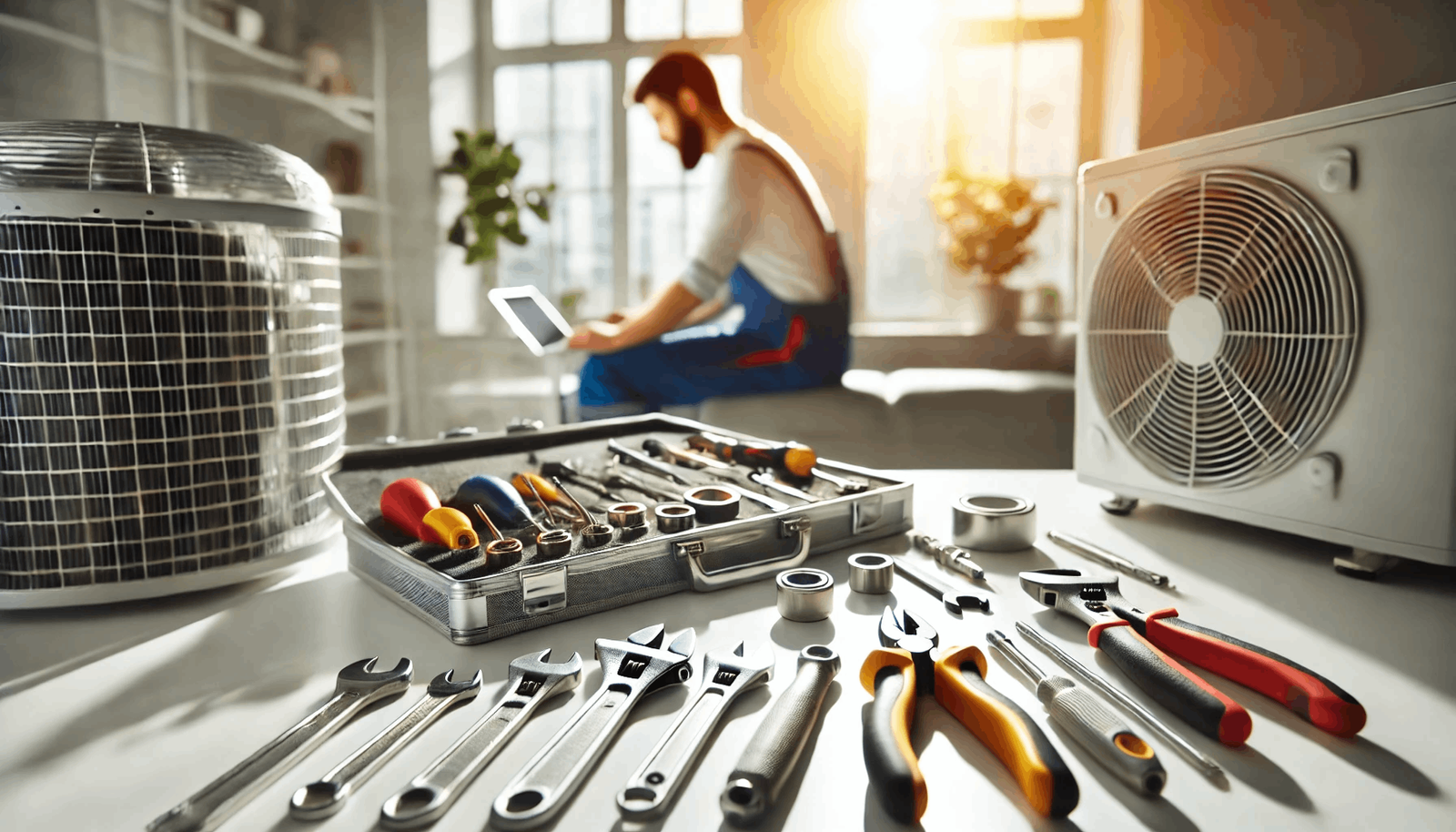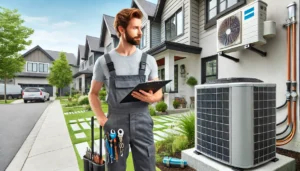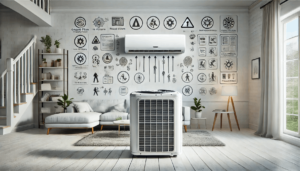Introduction
When it comes to HVAC repair, even small mistakes can lead to costly fixes, reduced efficiency, and the potential for bigger problems down the road. Whether you’re a homeowner attempting a do-it-yourself repair or you’ve hired a professional who isn’t as qualified as they should be, common repair errors can negatively affect your heating, ventilation, and air conditioning system.
This blog will cover some of the most frequent mistakes made during HVAC repairs, how to avoid them, and tips for maintaining your system properly. By understanding these pitfalls, you can ensure your HVAC system runs smoothly, stays energy-efficient, and lasts for years to come.
Understanding Common HVAC Repair Mistakes
The key to keeping your HVAC system running efficiently and extending its lifespan is avoiding common mistakes during repairs and maintenance. Many homeowners make these errors, which can lead to costly breakdowns, reduced system efficiency, and higher energy bills. Below are some of the most frequent HVAC repair mistakes that homeowners should avoid.
Ignoring Regular Maintenance
One of the most common and easily avoidable HVAC repair mistakes is neglecting regular maintenance. Like any mechanical system, HVAC units require consistent care to function properly. Unfortunately, many homeowners only think about their system when something goes wrong, often leading to expensive repairs that could have been prevented.
Skipping regular maintenance can lead to several issues, such as:
- Decreased energy efficiency: Without regular cleaning and tuning, your HVAC system has to work harder to heat or cool your home, increasing energy consumption and raising utility bills.
- Increased wear and tear: Failing to inspect and maintain components like coils, fans, and refrigerant lines can cause them to wear out prematurely, leading to breakdowns.
- Reduced system lifespan: A lack of regular maintenance shortens the lifespan of your HVAC unit, forcing you to invest in a new system sooner than expected.
To avoid these problems, it’s crucial to schedule annual inspections and tune-ups with a professional HVAC technician. Regular maintenance ensures your system is operating at peak performance, catches minor issues before they become major problems, and can save you a lot of money over time.
Attempting DIY Repairs Without Proper Knowledge
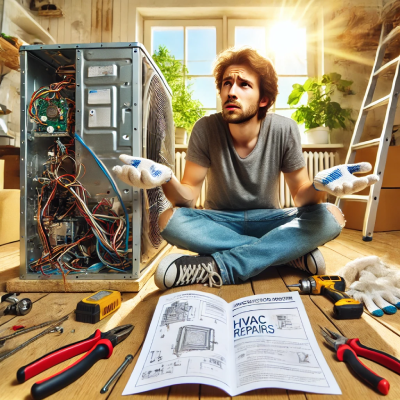
Another common HVAC repair mistake is attempting DIY repairs without the necessary expertise. While there are some minor tasks that homeowners can handle themselves—such as replacing air filters or checking the thermostat—many aspects of HVAC repair require specialized knowledge and tools.
Here’s why DIY HVAC repairs can backfire:
- Incorrect diagnosis: HVAC systems are complex, and diagnosing the root cause of a problem is not always straightforward. Homeowners often misidentify the issue, leading to improper repairs that can make the problem worse.
- Safety hazards: HVAC systems involve electrical components, gas lines, and refrigerants, all of which can pose serious safety risks if not handled properly. Without proper training, attempting to fix these components can result in personal injury or damage to your home.
- Voiding warranties: Many HVAC systems come with warranties that cover repairs and replacements. However, performing unauthorized repairs can void these warranties, leaving you responsible for the full cost of future repairs.
Rather than risking further damage or injury, it’s best to call a certified HVAC professional to handle repairs. They have the expertise and tools needed to safely and effectively fix any issues with your system.
Overlooking Thermostat Issues
One of the most overlooked aspects of HVAC repair is the thermostat. The thermostat controls the temperature settings for your HVAC system, and even minor issues with this device can cause major problems with heating and cooling efficiency.
Common thermostat-related issues include:
- Incorrect calibration: If the thermostat isn’t calibrated correctly, it may not accurately read the temperature in your home. This can cause your system to run too long or not long enough, leading to uneven heating or cooling.
- Dead batteries: Many thermostats are battery-powered, and dead batteries can cause the system to stop working altogether. It’s a simple fix, but often overlooked.
- Improper placement: Thermostats placed in direct sunlight, near drafts, or close to heat sources can give inaccurate temperature readings, causing the HVAC system to work harder than necessary.
To avoid these problems, ensure your thermostat is properly calibrated and check the batteries regularly. If you suspect a deeper issue, such as faulty wiring or a malfunctioning thermostat, it’s best to call a professional to inspect and repair the device.
Not Replacing Air Filters Frequently Enough
One of the simplest yet most neglected maintenance tasks is replacing the air filters in your HVAC system. Dirty air filters are a leading cause of poor system performance and can lead to numerous problems if not changed regularly.
Here’s why regularly replacing air filters is crucial:
- Reduced airflow: When air filters become clogged with dust, dirt, and debris, airflow is restricted, causing your HVAC system to work harder to circulate air throughout your home. This reduces energy efficiency and increases your energy bills.
- Poor indoor air quality: Dirty filters can’t effectively trap allergens, dust, and other pollutants, leading to poor indoor air quality. This is especially concerning for individuals with asthma, allergies, or other respiratory issues.
- System strain: A dirty filter forces the system’s components, such as the blower motor and fan, to work harder, leading to increased wear and tear and the likelihood of a breakdown.
To avoid these issues, air filters should be replaced every one to three months, depending on factors like the type of filter, the size of your home, and whether you have pets or allergies. Regular filter replacement is a simple and cost-effective way to improve system efficiency and maintain good indoor air quality.
How to Choose the Right HVAC Repair Service
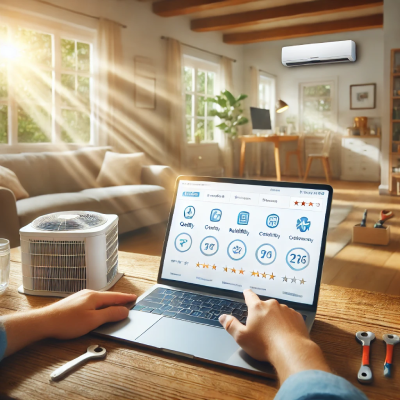
Selecting the right service provider for HVAC repair is crucial to ensuring the proper functioning and longevity of your system. With many companies offering HVAC services, it can be overwhelming to decide who to trust. Here are four key factors to consider when choosing the best HVAC repair service for your home.
Verifying Technician Certifications
One of the first things to check when hiring an HVAC repair service is whether the technicians are properly certified. Certified technicians have undergone formal training and passed exams to demonstrate their knowledge and expertise in working with HVAC systems. This ensures that they are capable of handling a wide range of repairs and are familiar with the latest industry standards and technologies.
Look for technicians with certifications from recognized organizations such as:
- NATE (North American Technician Excellence): A widely respected certification for HVAC technicians in North America, ensuring that they have the technical skills to perform repairs efficiently and safely.
- EPA Certification: If your HVAC system uses refrigerants, technicians must be EPA-certified to handle these materials safely.
Hiring certified technicians reduces the risk of mistakes during repairs and ensures that the job is done correctly. It also provides peace of mind that your HVAC system is in capable hands and being serviced by professionals who adhere to industry standards.
Checking Reviews and Testimonials
Online reviews and testimonials are valuable resources when choosing an HVAC repair service. Customer feedback gives you insight into the quality of service, professionalism, and reliability of the company. Positive reviews can reassure you that the company delivers on its promises, while negative reviews may signal potential red flags.
When evaluating reviews, consider the following:
- Consistency: A company with consistently high ratings across multiple platforms like Google, Yelp, and the Better Business Bureau is a good sign of quality service. However, a few negative reviews shouldn’t necessarily disqualify a company, as long as the majority of reviews are positive and issues are addressed professionally.
- Responses to complaints: A company that responds to negative reviews in a constructive, helpful manner shows that they care about customer satisfaction. Their willingness to address complaints indicates a commitment to improving service.
Word-of-mouth recommendations from family or friends can also be helpful. If someone you trust had a positive experience with an HVAC company, it’s likely that you will too.
Comparing Service Contracts and Pricing

When it comes to HVAC repair, pricing can vary significantly between companies, making it important to compare estimates and service contracts before making a decision. However, the cheapest option isn’t always the best. It’s crucial to understand exactly what’s included in the quoted price and whether there are any hidden fees.
Here’s what to consider when comparing service contracts and pricing:
- Transparent pricing: Reputable HVAC companies provide clear, upfront pricing, often in the form of written estimates. These estimates should outline the cost of parts, labor, and any additional fees so you know what to expect.
- Service contracts: Many companies offer maintenance contracts that provide regular inspections and tune-ups for a flat annual fee. Comparing these contracts can help you find the best value for long-term service. Some contracts may include perks like priority scheduling or discounts on repairs, which can be valuable if your system requires frequent maintenance.
- Warranties: Ensure the company offers warranties on both parts and labor. This protects you from paying out of pocket for faulty repairs or defective components. A solid warranty is a sign that the company stands behind the quality of their work.
Ultimately, it’s important to strike a balance between cost and quality when selecting an HVAC repair service. Avoid companies that offer suspiciously low prices, as this could indicate subpar service or the use of low-quality parts.
Importance of Emergency Repair Services
An important feature to look for when selecting an HVAC repair service is the availability of emergency repair services. HVAC systems can break down at any time, and losing heating during a cold winter night or cooling during a hot summer day can be more than just inconvenient—it can be dangerous.
Here’s why emergency services are essential:
- 24/7 availability: The best HVAC repair companies offer 24/7 emergency services, ensuring that a technician is available when you need them most. Whether your furnace stops working on a holiday or your air conditioner breaks down in the middle of a heatwave, having access to round-the-clock service can save you from uncomfortable or even hazardous conditions.
- Fast response times: In addition to availability, it’s important to choose a company that can respond quickly to your emergency. Some companies may offer same-day service, while others might take longer. Opting for a provider with quick response times ensures that your HVAC system is back up and running as soon as possible.
- Specialized knowledge: HVAC systems are complex, and not all issues are straightforward. Companies that offer emergency services tend to have experienced technicians who can diagnose and repair problems efficiently, even under pressure. This is crucial when your system fails unexpectedly and you need it fixed right away.
When choosing an HVAC repair service, ensure they offer emergency support, so you’re never left without heating or cooling when you need it most.
Best Practices to Maintain Your HVAC System
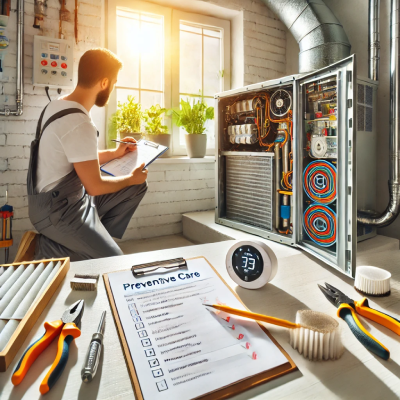
Regular maintenance of your HVAC system is essential to ensure its longevity, efficiency, and performance. Neglecting routine care can lead to costly HVAC repairs, decreased energy efficiency, and uncomfortable living conditions. By implementing best practices, you can avoid many of the common problems that arise with HVAC systems and improve their overall performance. Below are some key maintenance strategies every homeowner should follow.
Scheduling Annual Inspections
One of the most important steps in maintaining your HVAC system is scheduling annual inspections by a qualified technician. These inspections help identify potential issues before they escalate into major repairs, ensuring that your system continues to run smoothly.
During an annual inspection, a technician will:
- Check refrigerant levels: If your HVAC system uses refrigerants, the technician will check for any leaks or imbalances that could hinder the system’s cooling efficiency.
- Inspect electrical connections: Loose or damaged electrical connections can cause your system to malfunction or even pose safety hazards. A thorough inspection will ensure everything is operating correctly.
- Test system controls: A technician will test the thermostat and other controls to ensure they are working correctly. This helps avoid uneven heating or cooling and ensures that your system is operating efficiently.
- Lubricate moving parts: Over time, moving components like motors and fans can wear out or seize up if not properly lubricated. Regular lubrication reduces friction, minimizes wear, and ensures the system runs smoothly.
Annual inspections are crucial for extending the life of your HVAC system and minimizing the risk of unexpected breakdowns. Most experts recommend scheduling inspections in the spring for cooling systems and in the fall for heating systems, ensuring they are in top condition before peak usage periods.
Monitoring Energy Bills for Signs of Inefficiency
Keeping an eye on your energy bills is another simple yet effective way to monitor your HVAC system’s performance. If you notice a sudden or gradual increase in your energy costs without a corresponding change in your usage, it could be a sign that your system is becoming inefficient and may require repairs or maintenance.
Some common reasons for energy inefficiency in HVAC systems include:
- Dirty air filters: A clogged air filter forces the system to work harder to circulate air, leading to higher energy consumption. Replacing air filters regularly (every 1-3 months) can help maintain efficiency and reduce energy costs.
- Leaking ducts: Leaky or poorly sealed ducts can cause conditioned air to escape before it reaches your living space, causing the system to run longer to achieve the desired temperature. This not only wastes energy but also increases wear on the system.
- Faulty thermostat settings: If your thermostat is not calibrated properly or is malfunctioning, your system may run longer than necessary or at incorrect temperatures, increasing energy usage.
By regularly monitoring your energy bills and looking for unusual spikes, you can identify potential issues early and address them before they lead to major HVAC repairs.
Proper Cleaning of Ducts and Vents
Cleaning your HVAC system’s ducts and vents is essential for maintaining good airflow, reducing allergens, and keeping your system running efficiently. Over time, dust, dirt, and debris can accumulate in the ducts, restricting airflow and reducing the system’s efficiency. In some cases, this buildup can also reduce indoor air quality by circulating pollutants throughout your home.
Proper cleaning of ducts and vents involves:
- Clearing debris from vents: Regularly check and clean your HVAC vents to ensure they are free from obstructions like dust, pet hair, and dirt. Blocked vents can restrict airflow, forcing your system to work harder.
- Inspecting ductwork: Periodically inspect your home’s ductwork for signs of dust buildup, mold, or other contaminants. Professional duct cleaning may be necessary if there is significant buildup, especially if it impacts your home’s air quality or if anyone in your household suffers from allergies or respiratory issues.
- Using quality filters: High-efficiency air filters, such as HEPA filters, can capture smaller particles like dust mites, pollen, and mold spores, keeping your ducts cleaner and improving overall air quality. Replace filters regularly to ensure they continue working effectively.
Keeping your ducts and vents clean not only enhances air quality but also helps your HVAC system operate more efficiently by improving airflow. Neglecting this step can lead to increased strain on the system and the need for more frequent HVAC repairs.
Long-Term Benefits of Avoiding HVAC Repair Mistakes
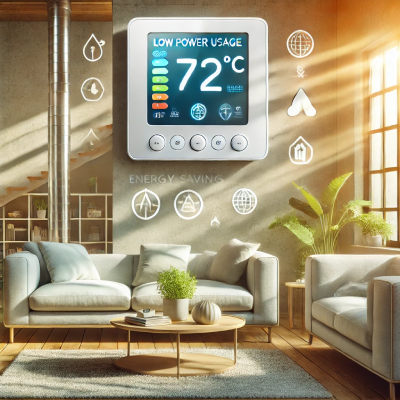
Properly maintaining your HVAC system and avoiding common HVAC repair mistakes can result in numerous long-term benefits for homeowners. From saving on energy bills to extending the lifespan of your system, addressing these mistakes early can help ensure that your system runs efficiently and reliably for years to come. Below, we’ll explore the key advantages of steering clear of HVAC repair pitfalls.
Increased System Efficiency
One of the most immediate and impactful benefits of avoiding HVAC repair mistakes is the boost in system efficiency. When an HVAC system is regularly maintained and repaired correctly, it can operate at optimal performance levels. Conversely, ignoring regular maintenance or attempting DIY repairs without the necessary knowledge can result in system inefficiencies that drive up energy usage.
Here’s how avoiding HVAC mistakes contributes to greater efficiency:
- Improved airflow: When filters, ducts, and other components are properly maintained, airflow is not restricted, allowing the system to distribute conditioned air more effectively. This means your HVAC system doesn’t have to work as hard to heat or cool your home, saving you money on energy bills.
- Optimized system settings: A well-maintained system ensures that thermostats and controls are accurately calibrated, preventing the system from running longer than necessary or using more energy than needed.
- Proper refrigerant levels: In systems that use refrigerant, incorrect handling or leaks can reduce cooling efficiency. Ensuring that refrigerant is handled by certified professionals keeps the system running smoothly and at peak performance.
By maintaining an efficient HVAC system, you can save a significant amount of money over time through reduced energy consumption, while also lowering your environmental footprint.
Reducing the Risk of Costly Breakdowns
Another major benefit of avoiding common HVAC repair mistakes is a reduced risk of unexpected and costly breakdowns. Many HVAC failures occur due to small, preventable issues that escalate over time, such as neglecting to replace filters, ignoring unusual noises, or failing to address thermostat problems.
Here’s how proper HVAC maintenance helps prevent expensive repairs:
- Early detection of issues: Regular inspections and proper repairs allow technicians to catch minor problems early, before they develop into major malfunctions. For example, a worn-out belt or faulty capacitor can be replaced easily and inexpensively during routine maintenance, but if left unaddressed, these issues could cause the entire system to fail, resulting in a costly repair or even system replacement.
- Less wear and tear: A system that is maintained according to manufacturer guidelines experiences less strain on its components. This reduces the likelihood of breakdowns caused by overworking parts like the blower motor, fans, or compressor.
- Fewer emergency repairs: Avoiding HVAC repair mistakes means fewer chances for emergency repairs, which are often more expensive due to after-hours or weekend service fees. Preventive maintenance minimizes the chances of being caught off guard by an HVAC failure when you need the system most.
By investing in regular maintenance and professional repairs, you significantly reduce the likelihood of costly breakdowns and avoid the inconvenience of emergency repairs.
Extending the Lifespan of Your HVAC System
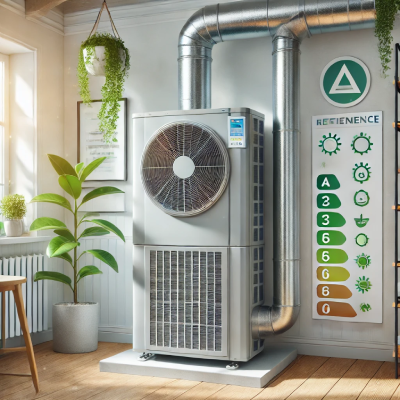
One of the most important long-term benefits of avoiding common HVAC repair mistakes is extending the lifespan of your system. HVAC systems are expensive investments, and maximizing their lifespan can save you thousands of dollars in replacement costs over the years.
Here’s how avoiding repair mistakes contributes to a longer-lasting HVAC system:
- Reduced stress on components: A well-maintained system operates smoothly without putting undue stress on essential components like the compressor, fans, or motor. Simple actions such as regularly changing air filters and ensuring proper refrigerant levels can prevent excessive strain on the system, helping it last longer.
- Prevention of major malfunctions: Routine maintenance helps identify potential issues before they become serious problems that could cause irreversible damage to the system. For example, fixing a minor leak in the refrigerant line prevents compressor failure, which could result in having to replace the entire system.
- Balanced wear and tear: When HVAC systems are serviced regularly and receive necessary repairs on time, they age more evenly. Parts like belts, bearings, and electrical connections that might wear out prematurely are replaced or repaired, allowing the system to operate in balance, reducing the chance of major breakdowns.
Regular maintenance also ensures that your HVAC system remains under warranty, as many warranties require proof of regular professional servicing. This not only helps extend the system’s life but also provides protection in the event of unexpected issues.
Conclusion
Avoiding common HVAC repair mistakes is key to ensuring the efficiency, longevity, and performance of your system. Regular maintenance, professional repairs, and careful attention to early warning signs can save you from costly breakdowns and keep your home comfortable year-round. By scheduling annual inspections, addressing small issues promptly, and hiring certified technicians for repairs, you can significantly reduce energy costs, improve air quality, and extend the lifespan of your HVAC system. Making these smart choices will not only keep your HVAC system running smoothly but also give you peace of mind knowing you’ve protected one of your home’s most critical systems.
Resources
- Energy Star – HVAC Maintenance Checklist
- HVAC.com – Common HVAC Repair Mistakes
- Energy Star – HVAC Maintenance Tips
- HVAC.com – Common HVAC Repair Mistakes
- The Spruce – HVAC System Maintenance and Repair Guide
- Energy Star – HVAC Maintenance Checklist
- The Spruce – HVAC System Maintenance Tips
- HVAC.com – Best Practices for HVAC System Maintenance
- NATE – HVAC Certifications
- Better Business Bureau – HVAC Reviews and Ratings
- HVAC.com – Choosing an HVAC Service Provider
- Energy Star – HVAC Maintenance Checklist
- HVAC.com – The Importance of Proper HVAC Maintenance
- The Spruce – Long-Term Benefits of HVAC Maintenance
- Energy Star – HVAC Maintenance
- HVAC.com – Common HVAC Repair Mistakes
- The Spruce – HVAC Repair and Maintenance
